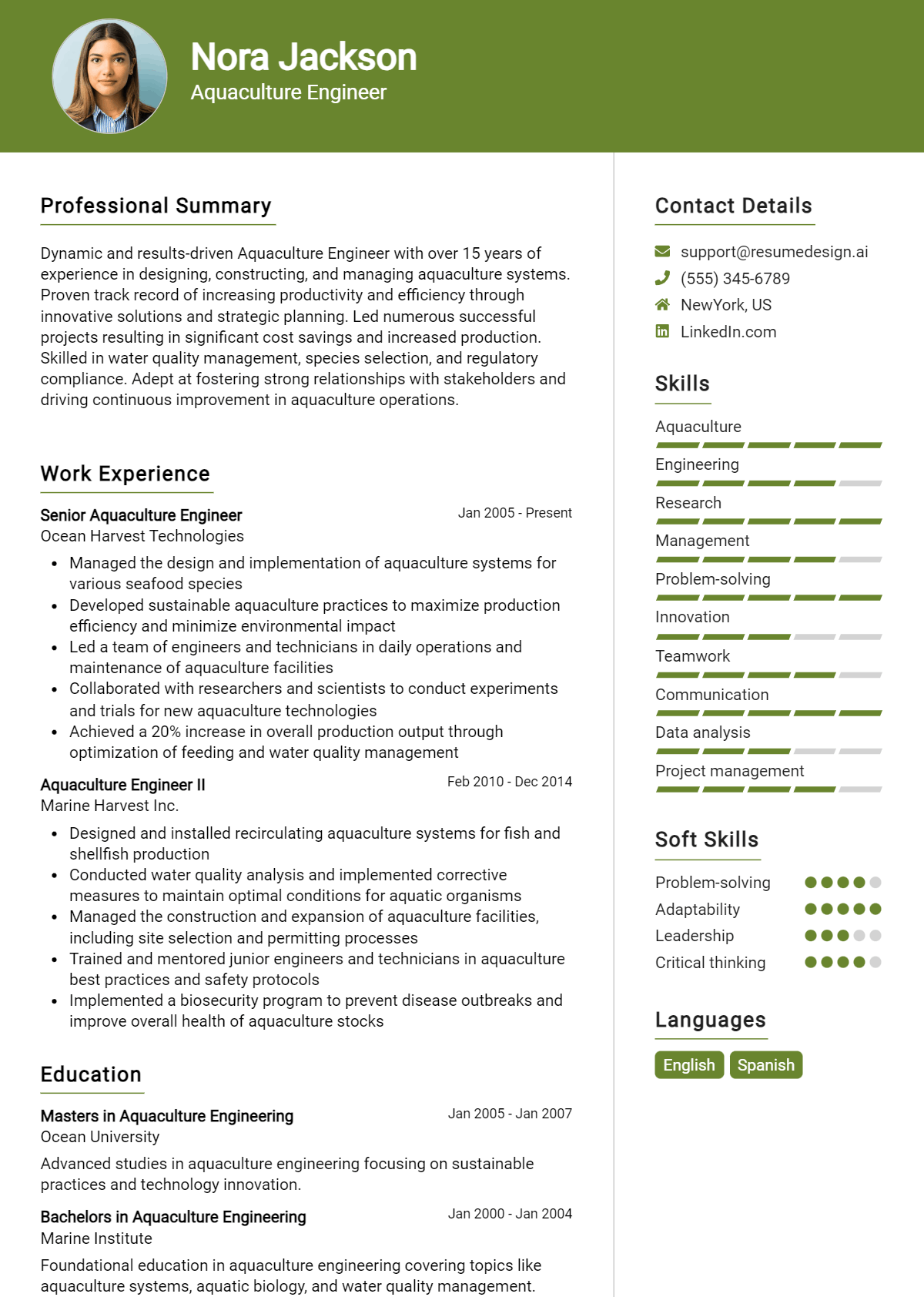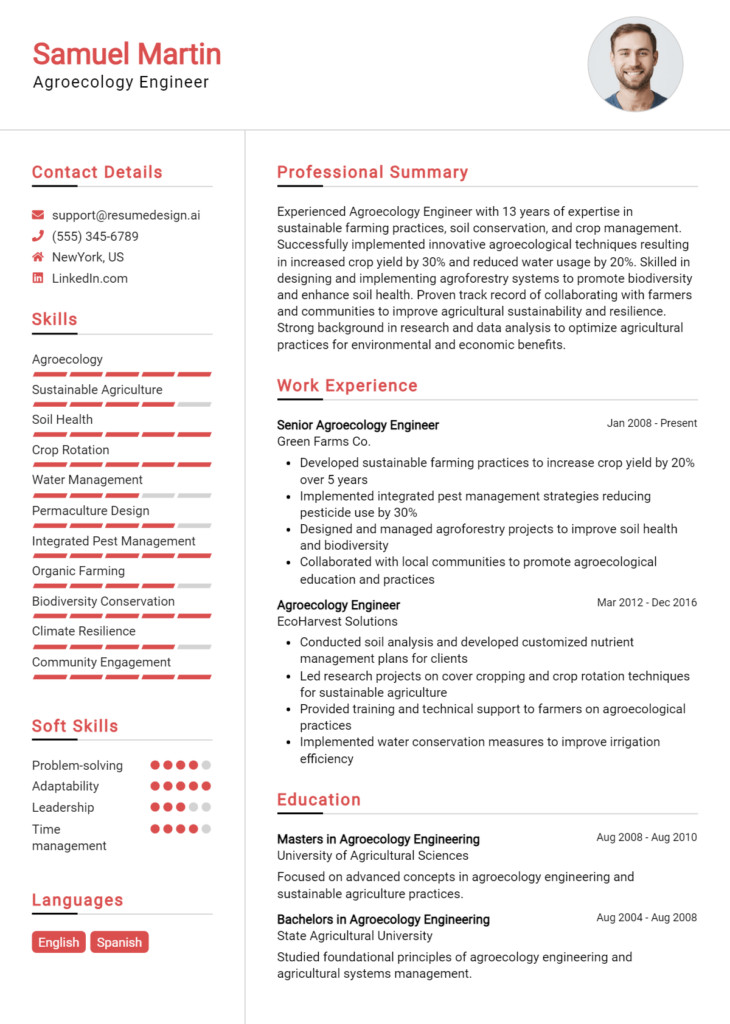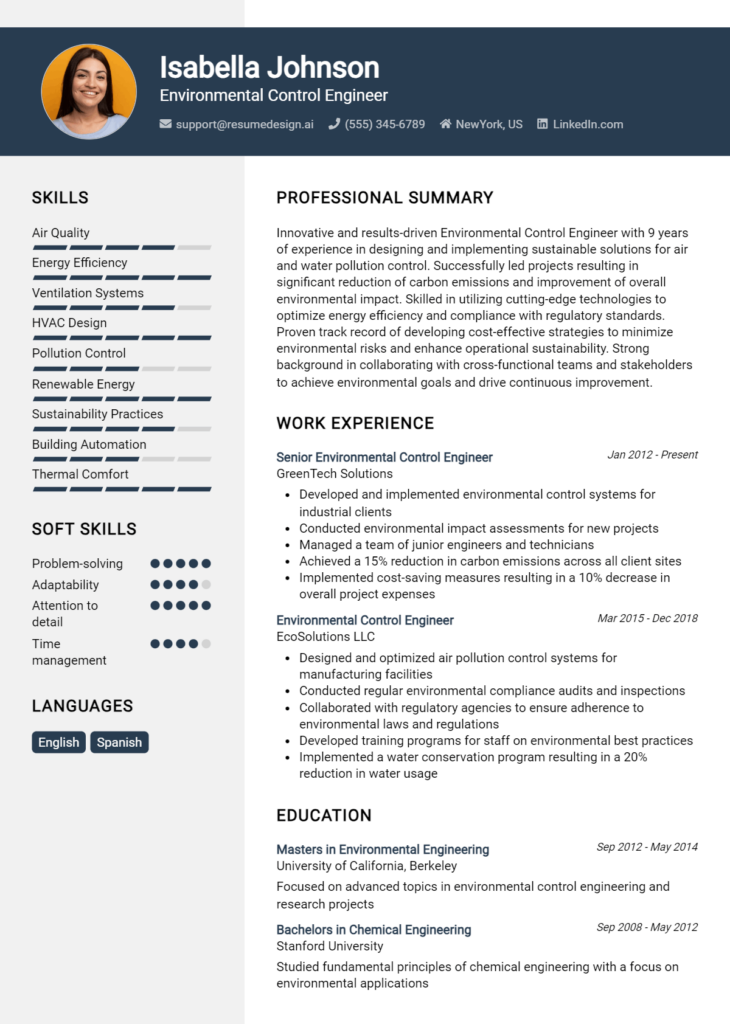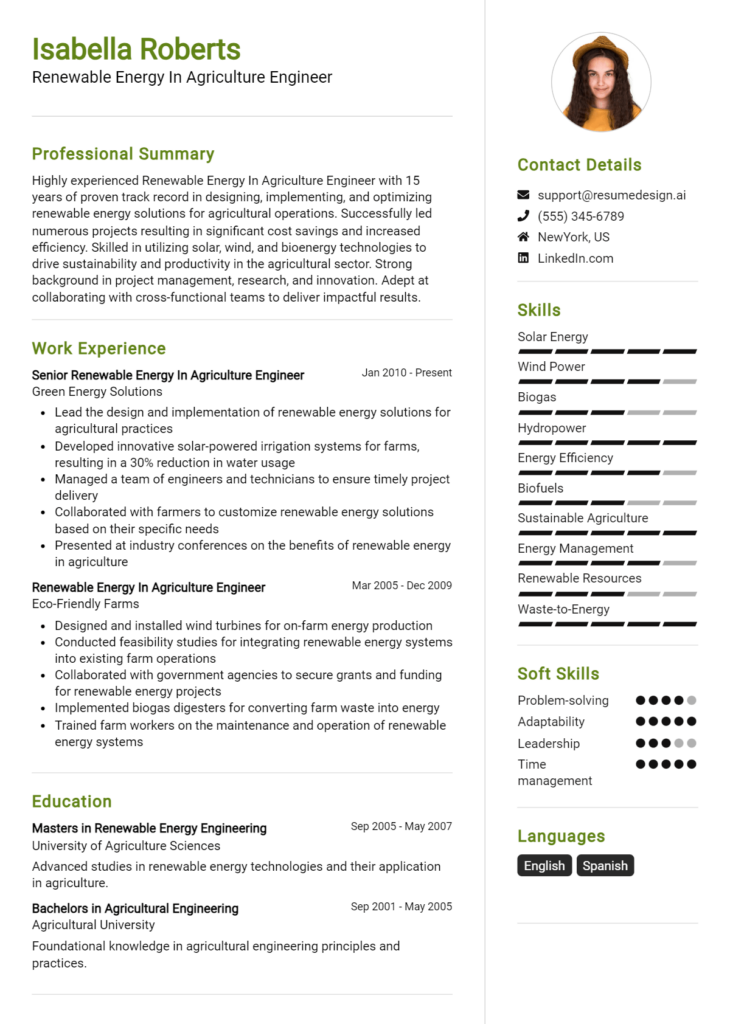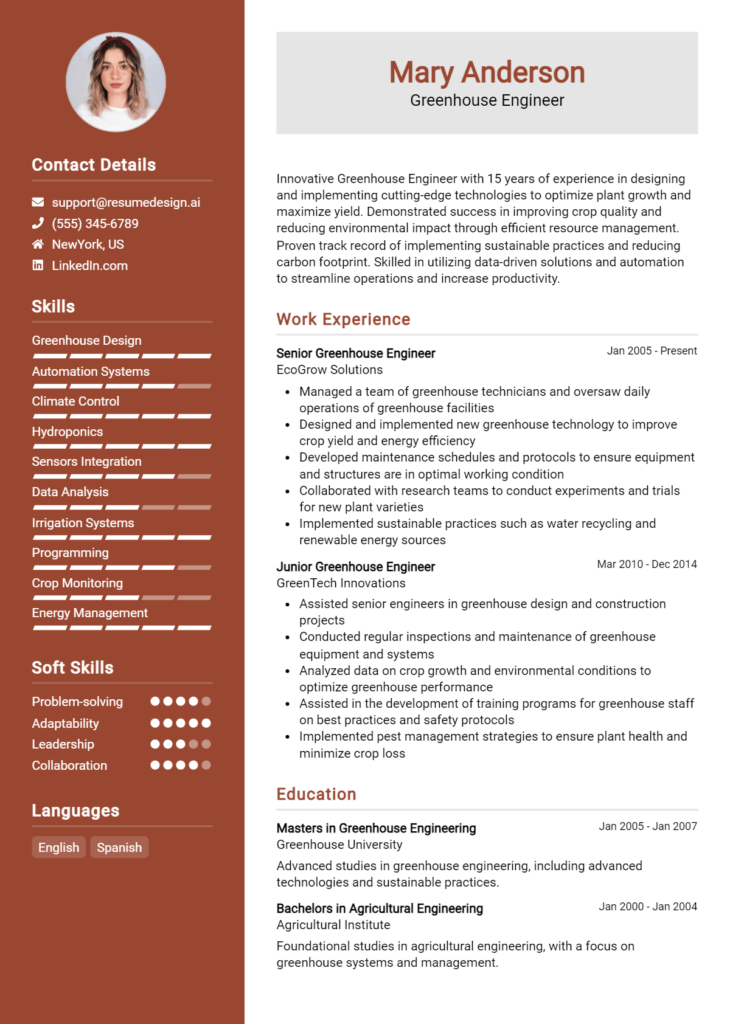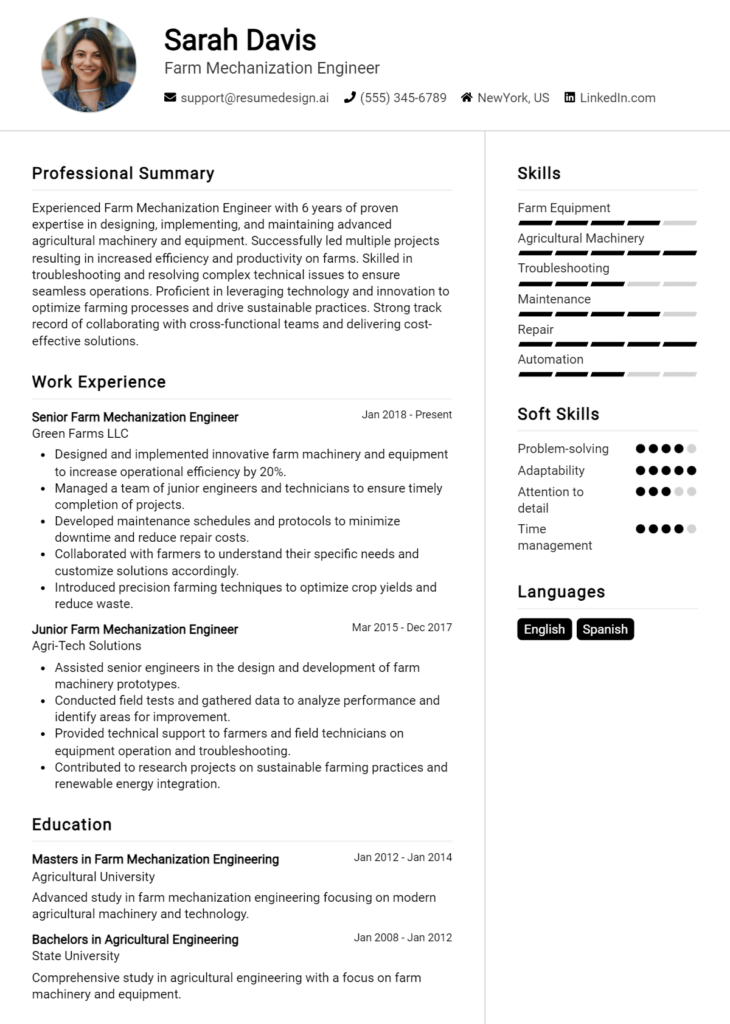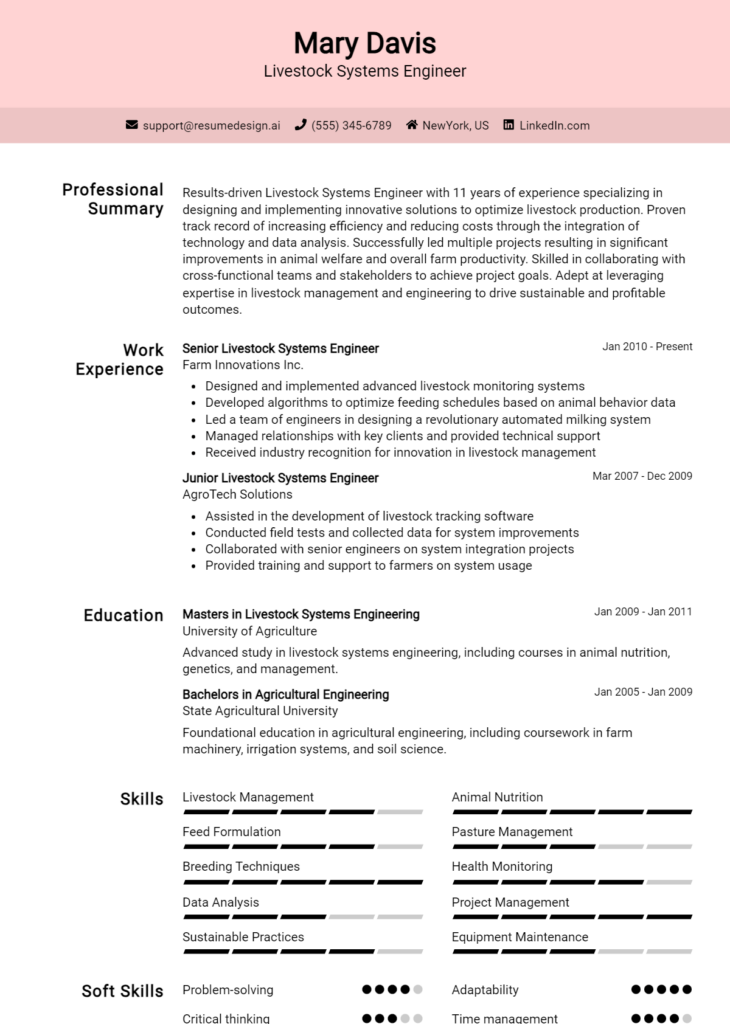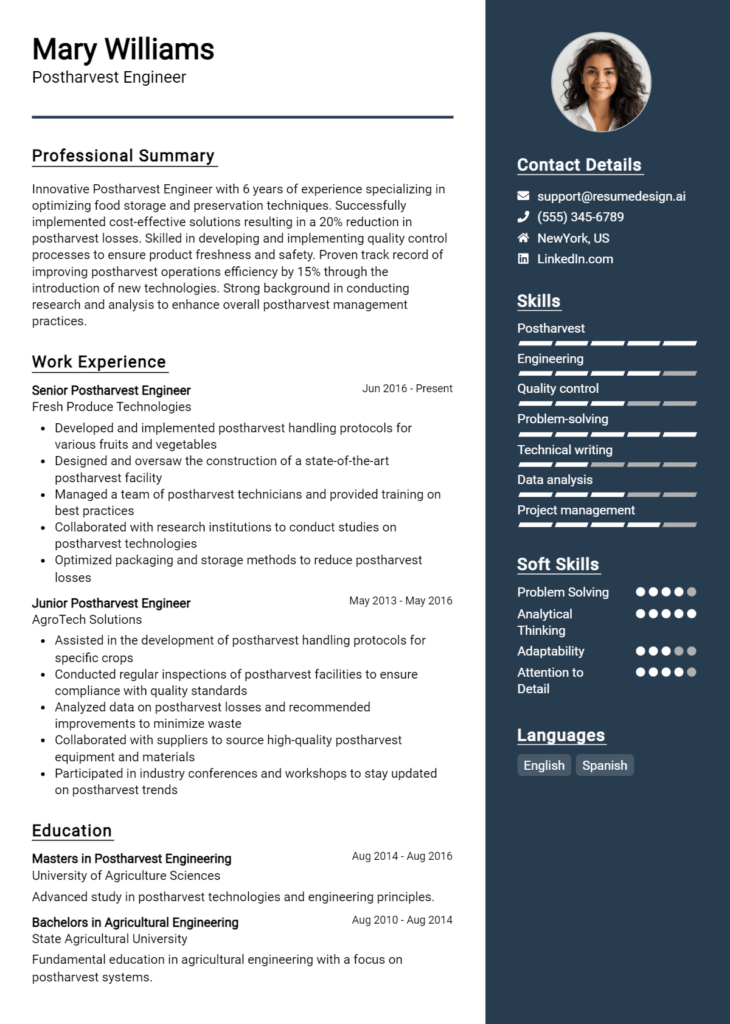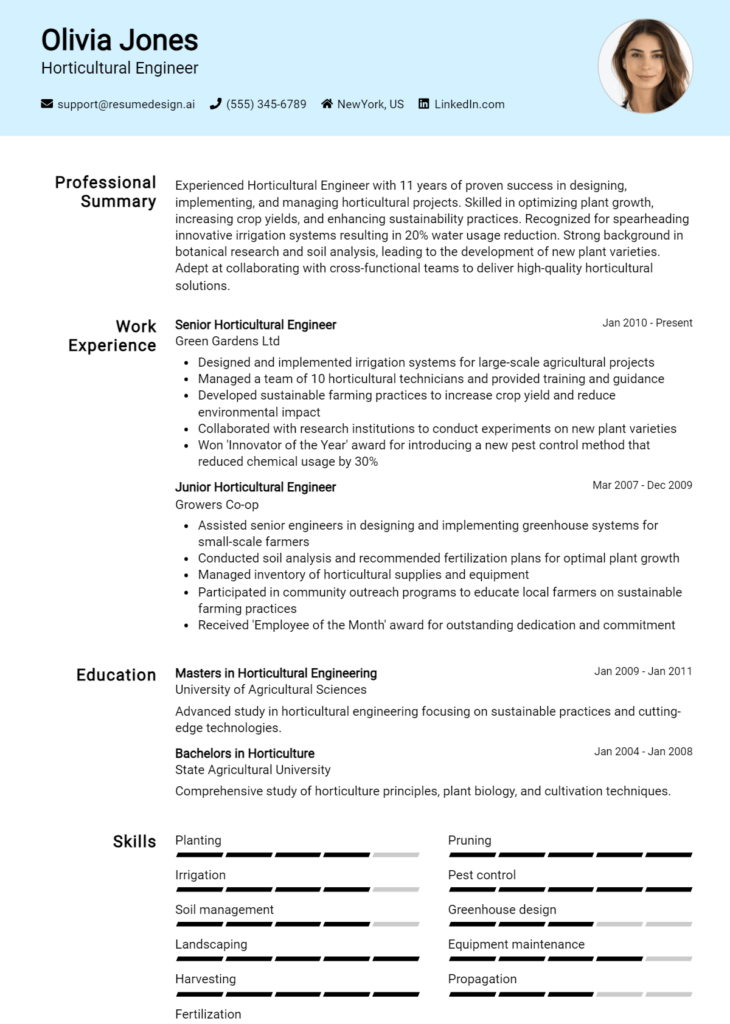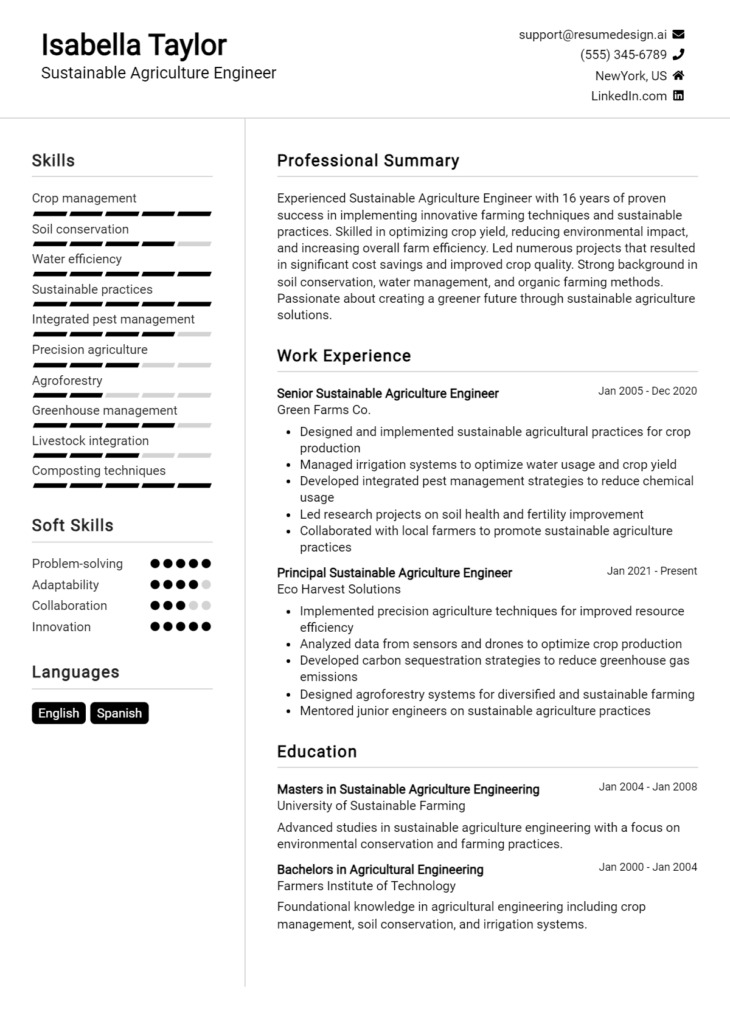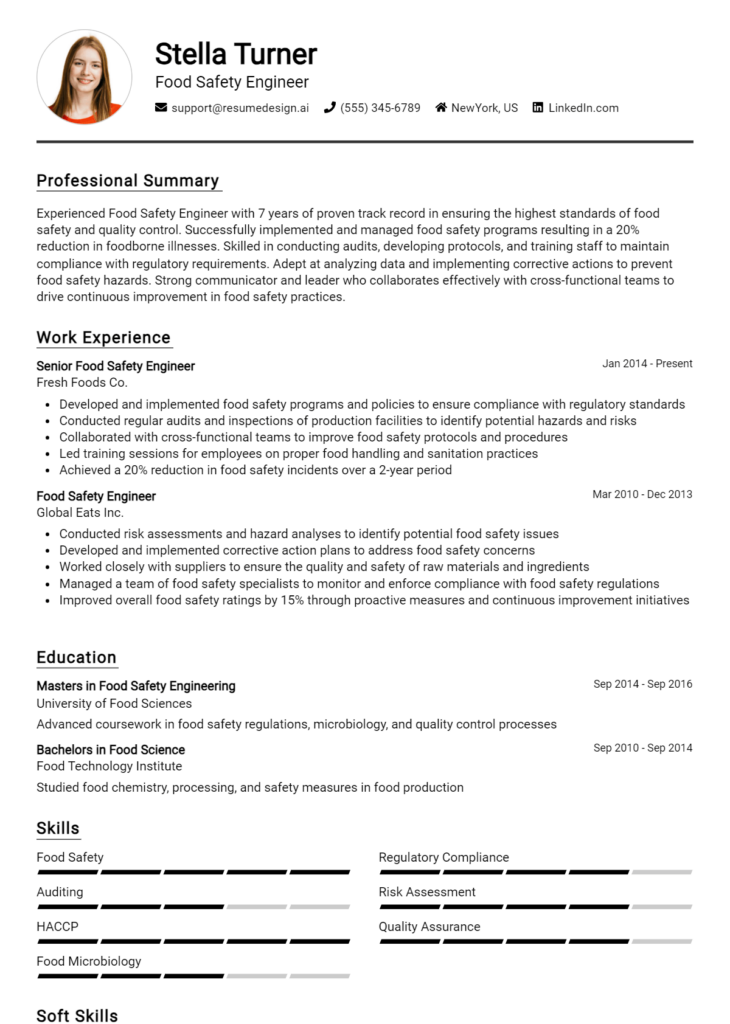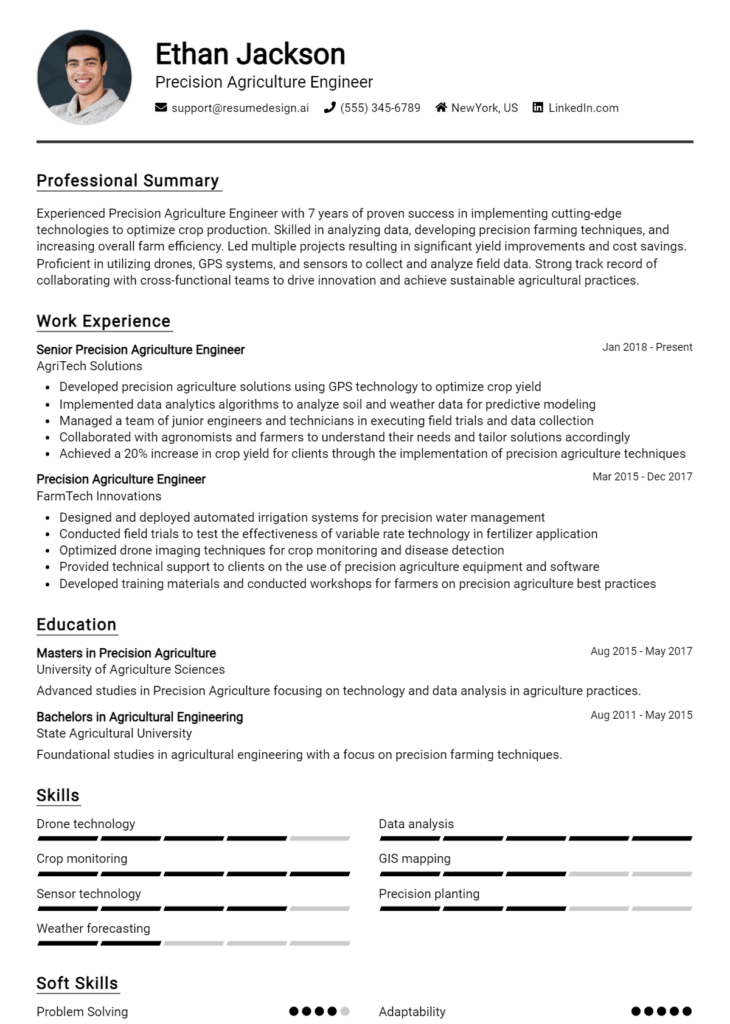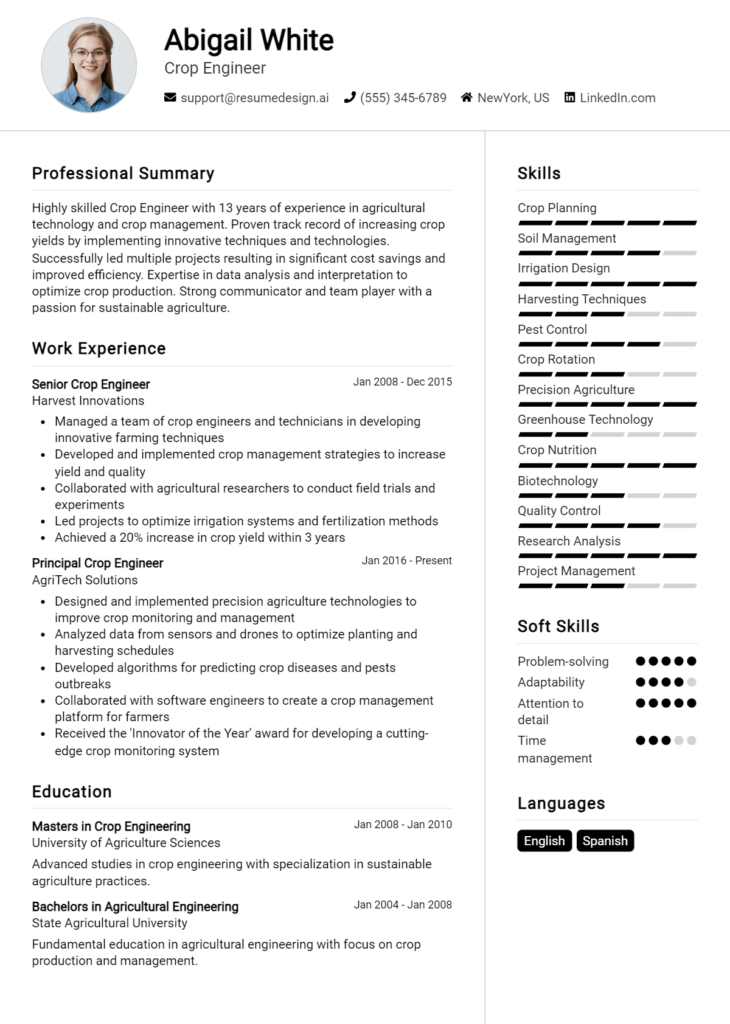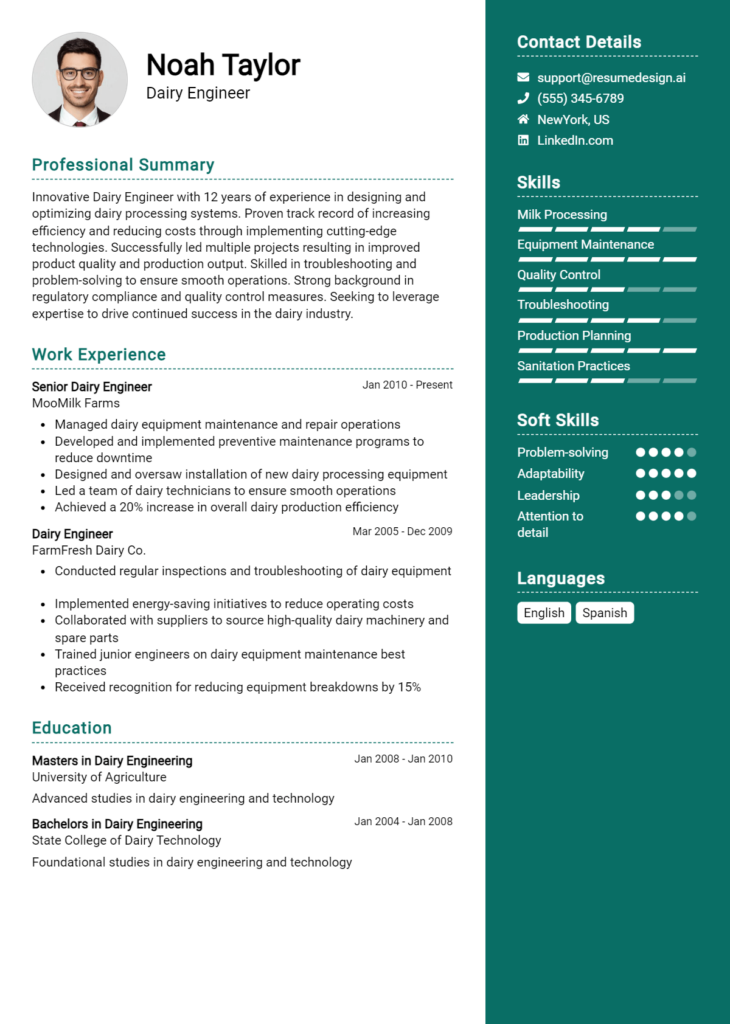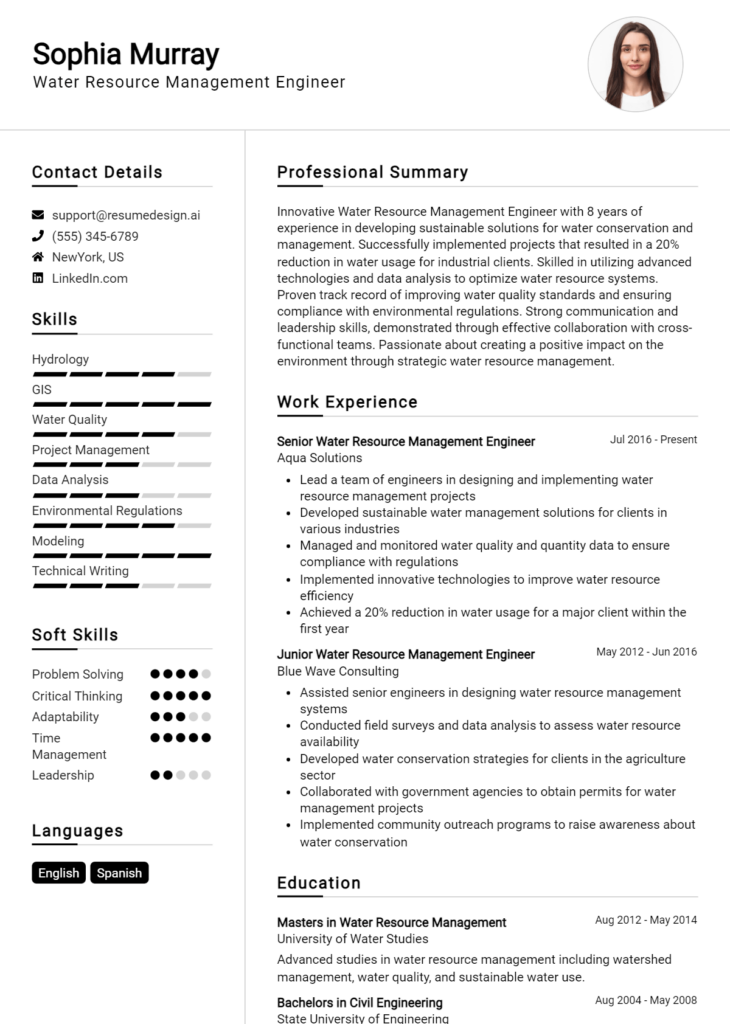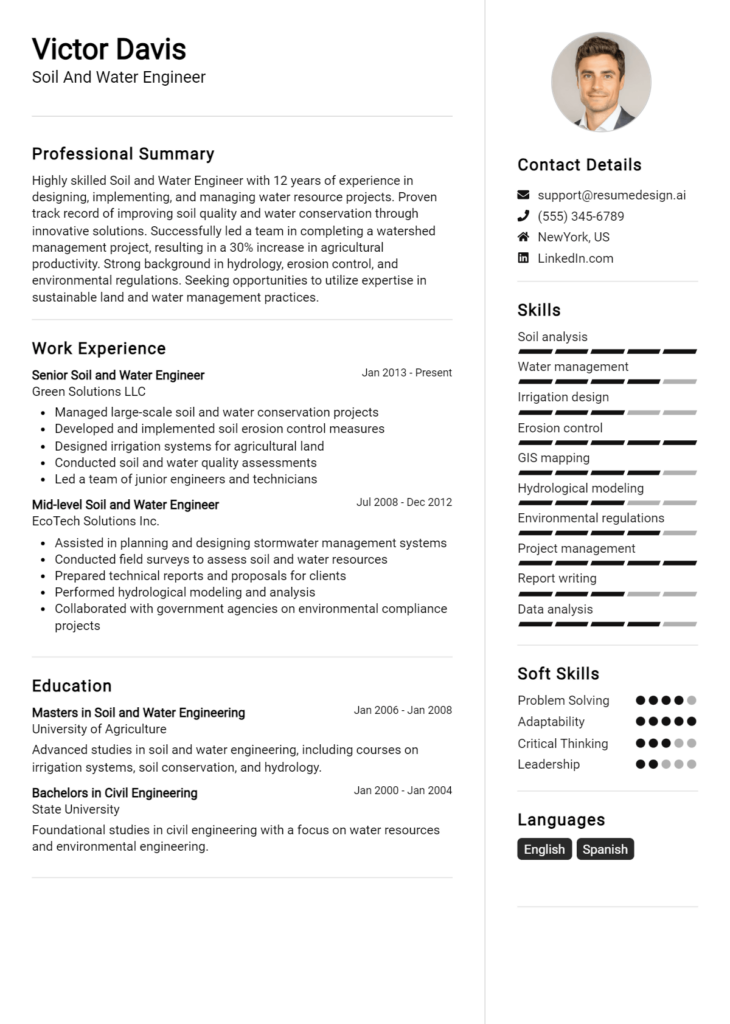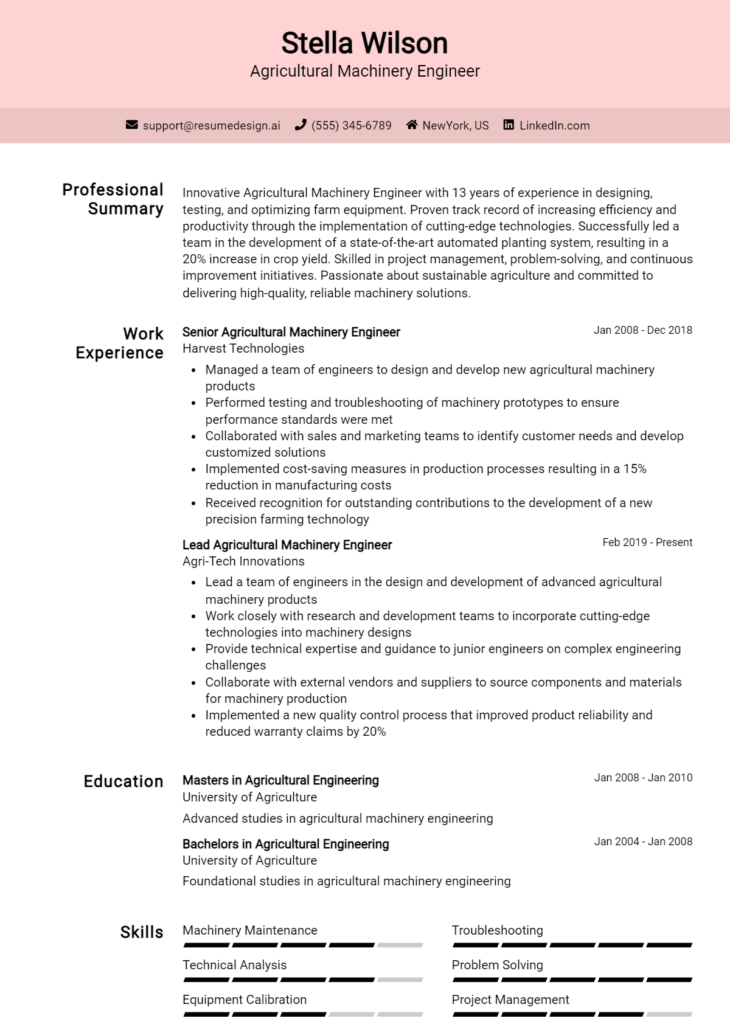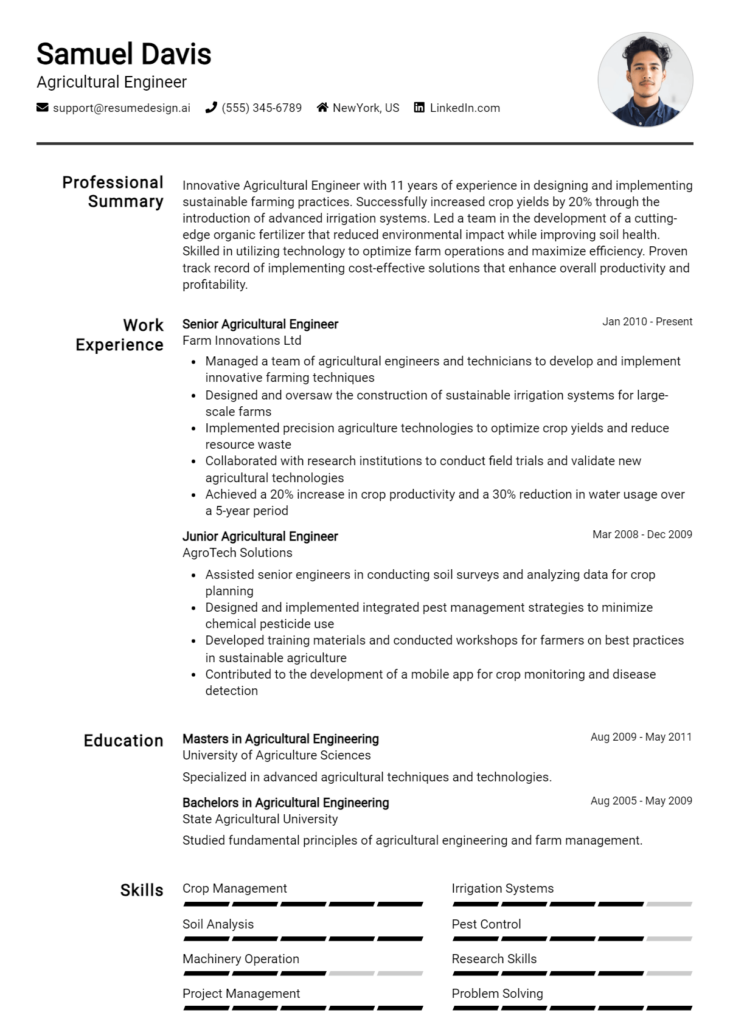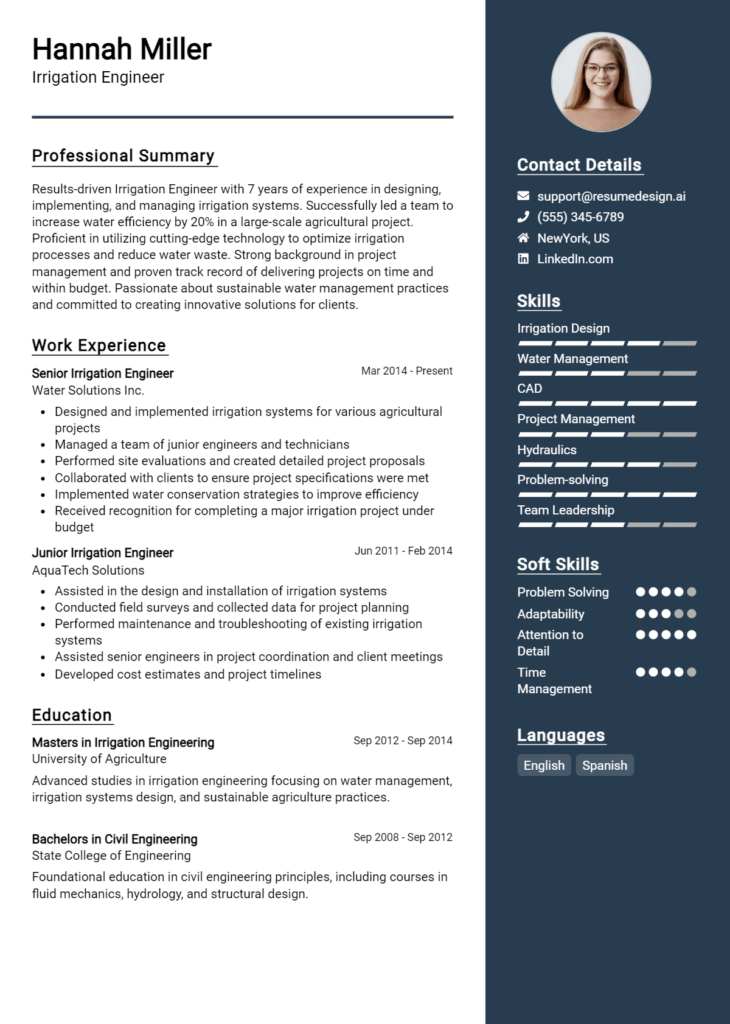Aquaculture Engineer Core Responsibilities
An Aquaculture Engineer plays a pivotal role in the sustainable development of aquaculture systems, bridging the gap between biology, engineering, and environmental science. Key responsibilities include designing and optimizing fish farming systems, ensuring water quality management, and implementing sustainable practices. Strong technical, operational, and problem-solving skills are essential to troubleshoot issues and enhance productivity. These capabilities contribute significantly to the organization's goals of efficiency and sustainability. A well-structured resume can effectively showcase these qualifications and highlight a candidate's potential impact.
Common Responsibilities Listed on Aquaculture Engineer Resume
- Design and develop aquaculture systems for fish and shellfish production.
- Monitor and manage water quality parameters to optimize aquatic life health.
- Conduct research and analysis to improve aquaculture practices.
- Collaborate with biologists, environmentalists, and production teams.
- Implement biosecurity measures to prevent disease outbreaks.
- Oversee the maintenance of equipment and infrastructure.
- Evaluate and select appropriate species for farming based on market demand.
- Provide technical training and support to staff on aquaculture techniques.
- Develop and manage budgets for aquaculture projects.
- Ensure compliance with environmental regulations and standards.
- Analyze production data to inform decision-making and strategy.
- Engage with stakeholders, including government agencies and communities.
High-Level Resume Tips for Aquaculture Engineer Professionals
In the competitive field of aquaculture engineering, a well-crafted resume is paramount to making a stellar first impression on potential employers. As this document often serves as the initial point of contact between candidates and hiring managers, it must effectively showcase both the unique skills and significant achievements of the applicant. A strong resume not only highlights technical expertise but also communicates a professional narrative that aligns with the specific needs of the aquaculture industry. This guide aims to provide practical and actionable resume tips tailored specifically for Aquaculture Engineer professionals, ensuring that your application stands out in a crowded job market.
Top Resume Tips for Aquaculture Engineer Professionals
- Tailor your resume to the job description by incorporating relevant keywords and phrases that reflect the specific requirements of the position.
- Showcase your relevant experience by detailing previous roles in aquaculture or related fields, emphasizing responsibilities and accomplishments.
- Quantify your achievements with metrics such as improved yield rates, cost reductions, or successful project completions to demonstrate your impact.
- Highlight industry-specific skills such as water quality management, feed formulation, and sustainable aquaculture practices, which are vital in this sector.
- Include any relevant certifications or training, such as specific software expertise or knowledge of regulatory compliance standards in aquaculture.
- Utilize a clean, professional layout with clear headings and bullet points to enhance readability and make key information easily accessible.
- Incorporate a summary statement at the top of your resume that succinctly captures your experience, skills, and career aspirations in aquaculture engineering.
- Emphasize teamwork and collaboration experiences, as aquaculture projects often require cross-disciplinary cooperation.
- Keep your resume concise, ideally one page, focusing on the most pertinent information to maintain the reader’s attention.
By implementing these tips, Aquaculture Engineer professionals can significantly enhance their resumes, increasing their chances of landing a job in this dynamic field. A strategic approach to resume writing not only showcases qualifications but also positions candidates as knowledgeable and competent professionals ready to contribute to the growth and sustainability of the aquaculture industry.
Why Resume Headlines & Titles are Important for Aquaculture Engineer
In the competitive field of aquaculture engineering, a well-crafted resume headline or title is crucial for making a lasting first impression. It serves as the first point of contact between candidates and hiring managers, providing an opportunity to immediately capture attention and succinctly summarize key qualifications. A strong headline can encapsulate a candidate's expertise, skills, and experience in just a few words, making it easier for recruiters to quickly assess their fit for the role. Therefore, it’s essential that the headline is concise, relevant, and directly aligned with the specific job being applied for, thereby enhancing the chances of getting noticed in a crowded applicant pool.
Best Practices for Crafting Resume Headlines for Aquaculture Engineer
- Keep it concise: Aim for a headline that is no longer than 10-12 words.
- Be role-specific: Use terms and phrases that are specific to aquaculture engineering.
- Highlight key strengths: Focus on your most relevant skills and accomplishments.
- Use action-oriented language: Start with strong action verbs to convey impact.
- Incorporate keywords: Use industry-related keywords that align with the job description.
- Avoid jargon: Make sure your headline is easily understandable to all readers.
- Align with the job: Tailor your headline to match the specific requirements of the job you are applying for.
- Showcase your unique value: Focus on what sets you apart from other candidates.
Example Resume Headlines for Aquaculture Engineer
Strong Resume Headlines
Innovative Aquaculture Engineer with 10+ Years of Sustainable Farming Experience
Expert in Aquaculture Systems Design and Optimization for Increased Yield
Results-Driven Aquaculture Engineer Specializing in Fish Health Management
Aquaculture Engineer with Proven Track Record in Project Management and Environmental Compliance
Weak Resume Headlines
Aquaculture Engineer
Experienced Professional Seeking Job
Looking for Opportunities in Aquaculture
The strong headlines are effective because they clearly convey the candidate’s unique qualifications and expertise while being tailored to the aquaculture engineering field. They utilize specific language that resonates with potential employers, showcasing relevant experience and skills. In contrast, the weak headlines fail to impress due to their vagueness and lack of specificity. They do not provide any meaningful information about the candidate’s qualifications or what they bring to the table, ultimately making them less memorable and less likely to catch a hiring manager's eye.
Writing an Exceptional Aquaculture Engineer Resume Summary
A resume summary is a critical component for an Aquaculture Engineer, as it serves as the first impression a hiring manager has of a candidate. A well-crafted summary quickly captures attention by showcasing key skills, relevant experience, and significant accomplishments tailored to the specific job role. It should be concise and impactful, allowing the candidate to present their qualifications in a manner that resonates with the employer's needs and sets them apart from other applicants.
Best Practices for Writing a Aquaculture Engineer Resume Summary
- Quantify Achievements: Use specific numbers and metrics to highlight the impact of your work.
- Focus on Relevant Skills: Emphasize technical skills and knowledge that align with the job description.
- Tailor the Summary: Customize your summary for each job application to highlight the most pertinent qualifications.
- Use Industry Terminology: Incorporate relevant jargon and terminology to demonstrate expertise in aquaculture.
- Be Concise: Keep the summary brief, ideally within 2-4 sentences, to maintain the reader's attention.
- Highlight Problem-Solving Abilities: Showcase examples of how you addressed challenges in past roles.
- Include Certifications: Mention any relevant certifications or licenses that enhance your qualifications.
- Showcase Teamwork and Leadership: If applicable, highlight experiences that demonstrate your ability to work collaboratively or lead projects.
Example Aquaculture Engineer Resume Summaries
Strong Resume Summaries
Proven Aquaculture Engineer with over 8 years of experience in sustainable fish farming, specializing in water quality management and system design. Successfully increased production efficiency by 30% through innovative aeration techniques, leading to a significant reduction in operational costs.
Detail-oriented Aquaculture Engineer adept at developing and implementing aquaculture systems. Led a team in a project that resulted in a 25% increase in yield while reducing resource usage by 15%, recognized for excellence in project management and environmental sustainability.
Experienced Aquaculture Engineer with a strong background in recirculating aquaculture systems (RAS). Designed and installed RAS that improved fish growth rates by 20%, contributing to a profitable expansion of company operations in the marine sector.
Weak Resume Summaries
Aquaculture Engineer with some experience in fish farming and water management. Looking for a job in a related field.
Dedicated professional seeking opportunities in aquaculture. Experienced in various tasks but not limited to engineering and management.
The strong resume summaries are effective because they provide specific, quantifiable results and relevant skills that directly address the needs of the hiring manager. They clearly articulate the candidate's contributions and successes in previous roles, demonstrating their value. Conversely, the weak summaries lack detail and specificity, making them appear generic and less compelling, thereby failing to capture the interest of potential employers.
Work Experience Section for Aquaculture Engineer Resume
The work experience section of an Aquaculture Engineer resume is a critical component that highlights the candidate's technical skills, leadership capabilities, and commitment to delivering high-quality products. This section showcases how an individual has applied their engineering knowledge in real-world situations, managed teams effectively, and contributed to the success of various aquaculture projects. By quantifying achievements and aligning experiences with industry standards, candidates can significantly enhance their appeal to potential employers, demonstrating their proficiency and readiness to tackle the challenges of the aquaculture industry.
Best Practices for Aquaculture Engineer Work Experience
- Clearly outline your technical skills relevant to aquaculture engineering, such as water quality management, system design, and sustainability practices.
- Quantify your achievements with specific metrics (e.g., improved yield by 20%, reduced costs by 15%) to provide concrete evidence of your contributions.
- Highlight leadership experiences where you managed teams or projects, focusing on collaboration and effective communication.
- Tailor your work experience to align with industry standards and job descriptions, emphasizing relevant technologies and methodologies.
- Use action verbs to describe your responsibilities and accomplishments, making your experiences dynamic and engaging.
- Include notable projects that showcase innovative solutions or advancements in aquaculture practices.
- Incorporate any relevant certifications, licenses, or training that are recognized in the aquaculture field.
- Maintain a clear and organized format that allows potential employers to quickly identify key information and accomplishments.
Example Work Experiences for Aquaculture Engineer
Strong Experiences
- Led a team of 10 in the design and implementation of a recirculating aquaculture system, increasing fish yield by 30% while reducing water usage by 25%.
- Developed a water quality monitoring protocol that improved overall system efficiency, resulting in a 15% reduction in operational costs.
- Collaborated with a cross-functional team to launch a new aquaculture feed product, achieving a 40% increase in market share within one year.
- Successfully managed a $500,000 aquaculture project from conception to completion, delivering ahead of schedule and under budget.
Weak Experiences
- Worked on various aquaculture projects without any specific details or outcomes.
- Assisted in team efforts for system improvements but did not specify my role or contributions.
- Participated in meetings about aquaculture practices without describing the impact of those discussions.
- Gained experience in aquaculture engineering through internships; however, no quantifiable results were mentioned.
The strong experiences are considered effective because they clearly demonstrate quantifiable outcomes, leadership roles, and specific contributions to projects, making them impactful and memorable to potential employers. In contrast, the weak experiences lack detail and measurable achievements, making it difficult for hiring managers to gauge the candidate's value or capabilities in the field of aquaculture engineering.
Education and Certifications Section for Aquaculture Engineer Resume
The education and certifications section of an Aquaculture Engineer resume is crucial in showcasing the candidate's academic achievements and ongoing professional development. This section not only highlights the foundational knowledge gained through formal education but also illustrates the candidate's commitment to staying current in the field through industry-relevant certifications and specialized training. By including pertinent coursework and credentials, candidates can significantly enhance their credibility and demonstrate their alignment with the specific demands of the job role, positioning themselves as qualified and dedicated professionals in the aquaculture industry.
Best Practices for Aquaculture Engineer Education and Certifications
- Focus on degrees and coursework directly related to aquaculture, marine biology, or environmental science.
- Include industry-recognized certifications such as Certified Aquaculture Professional (CAP) or similar credentials.
- Provide details on specialized training programs or workshops that enhance technical skills relevant to aquaculture engineering.
- List certifications that demonstrate knowledge of sustainable practices and regulatory compliance in aquaculture.
- Emphasize advanced degrees (Master’s or Ph.D.) if applicable, as they can set candidates apart from others.
- Keep descriptions concise but informative, showcasing the most relevant coursework or training.
- Regularly update this section to reflect new qualifications or certifications earned.
- Use clear formatting to improve readability and highlight key accomplishments or credentials.
Example Education and Certifications for Aquaculture Engineer
Strong Examples
- Bachelor of Science in Aquaculture Engineering, University of Coastal Studies, 2020
- Certified Aquaculture Professional (CAP), Aquaculture Society, 2021
- Advanced Training in Sustainable Aquaculture Practices, Marine Institute, 2022
- Master’s Degree in Environmental Science with a focus on Aquaculture Systems, Oceanic University, 2023
Weak Examples
- Bachelor of Arts in History, State University, 2015
- Certification in Basic First Aid, National Safety Council, 2019
- Online Course in Cooking Seafood, Culinary Academy, 2020
- High School Diploma, Local High School, 2014
The strong examples are considered relevant because they directly relate to the field of aquaculture engineering, showcasing specialized knowledge and skills that are applicable to the role. They include degrees and certifications that are recognized in the industry, reflecting a commitment to professional development. Conversely, the weak examples are deemed irrelevant as they do not pertain to aquaculture or engineering, indicating a lack of focus on the necessary qualifications for the job. These examples highlight the importance of aligning educational background and certifications with career objectives in the aquaculture sector.
Top Skills & Keywords for Aquaculture Engineer Resume
In the highly specialized field of aquaculture engineering, the importance of showcasing relevant skills on a resume cannot be overstated. Employers seek candidates who possess a blend of technical knowledge and interpersonal abilities that are crucial for success in this sector. A well-crafted resume that highlights both hard and soft skills demonstrates not only your expertise but also your capacity to work collaboratively in diverse environments. This dual focus helps to establish you as a well-rounded candidate, making it essential to reflect on your skills and work experience in a compelling manner.
Top Hard & Soft Skills for Aquaculture Engineer
Soft Skills
- Strong communication skills
- Team collaboration
- Problem-solving abilities
- Adaptability to change
- Attention to detail
- Time management
- Critical thinking
- Leadership qualities
- Interpersonal skills
- Project management
Hard Skills
- Knowledge of aquaculture systems
- Water quality management
- Fish biology and habitat requirements
- Environmental impact assessment
- Aquatic health management
- Data analysis and interpretation
- Design and maintenance of aquaculture facilities
- Knowledge of regulatory compliance
- Proficiency in computer modeling and simulation
- Experience with sustainable aquaculture practices
These skills are essential in demonstrating your readiness to tackle the challenges faced in aquaculture engineering, making them pivotal in your resume's effectiveness.
Stand Out with a Winning Aquaculture Engineer Cover Letter
As a dedicated Aquaculture Engineer with over five years of experience in the field, I am excited to apply for the position at your esteemed organization. My background in aquatic system design and sustainable farming practices, combined with my passion for developing innovative solutions in aquaculture, aligns seamlessly with your mission to enhance food security through responsible fish farming. I am eager to contribute my expertise in engineering principles to improve production efficiency and sustainability in your operations.
Throughout my career, I have successfully designed and implemented various aquaculture systems, including recirculating aquaculture systems (RAS) and integrated multi-trophic aquaculture (IMTA) setups. My hands-on experience with water quality management, feed optimization, and species selection has enabled me to increase production rates while minimizing environmental impact. Additionally, I have collaborated closely with multidisciplinary teams to conduct research on the latest advancements in aquaculture technology, ensuring that our practices adhere to the highest standards of sustainability and animal welfare.
I am particularly impressed by your company’s commitment to innovation and sustainability within the aquaculture sector. I am eager to bring my technical skills and problem-solving abilities to your team, helping to develop state-of-the-art systems that not only meet but exceed industry standards. I am confident that my proactive approach and strong communication skills will allow me to work effectively with colleagues and stakeholders to drive projects forward and achieve shared goals.
Thank you for considering my application. I am looking forward to the opportunity to discuss how my skills and experiences can contribute to the ongoing success of your organization. I am excited about the possibility of working together to create sustainable aquaculture solutions that benefit both the industry and the environment.
Common Mistakes to Avoid in a Aquaculture Engineer Resume
When crafting a resume for the role of an Aquaculture Engineer, it's crucial to present a professional image that accurately reflects your skills and experiences. However, many candidates make common mistakes that can undermine their chances of landing an interview. By being aware of these pitfalls, you can ensure that your resume stands out for the right reasons. Here are some frequent mistakes to avoid:
Generic Objective Statement: Using a vague objective statement can make your resume seem unoriginal. Tailor it to reflect your specific interest in aquaculture and the role you are applying for.
Lack of Relevant Skills: Omitting key skills related to aquaculture, such as knowledge of aquatic biology, water quality management, or sustainable farming practices, can lead to missed opportunities. Highlight both technical and soft skills relevant to the field.
Ignoring Industry Keywords: Failing to incorporate industry-specific terminology can result in your resume not passing through Applicant Tracking Systems (ATS). Research the job description and include relevant keywords that match your qualifications.
Unquantified Achievements: Listing duties without quantifying achievements can make your contributions seem less impactful. Use metrics or specific examples to illustrate how you improved systems or processes in previous roles.
Inconsistent Formatting: Poor formatting can distract from the content of your resume. Ensure consistent font styles, sizes, and spacing throughout the document for a polished look.
Focusing on Irrelevant Experience: Including unrelated work experience can detract from your qualifications. Focus on positions that highlight your engineering skills and aquaculture knowledge, and minimize unrelated jobs.
Typos and Grammatical Errors: Simple mistakes can create an impression of carelessness. Always proofread your resume multiple times or ask someone else to review it for errors.
Overloading with Information: Providing too much detail can overwhelm hiring managers. Aim for a concise resume that highlights the most relevant experiences and skills in a clear and organized manner.
Conclusion
As an Aquaculture Engineer, your role encompasses a variety of responsibilities aimed at enhancing the efficiency and sustainability of aquatic farming systems. Key points covered in this article include the importance of understanding aquatic ecosystems, the integration of technology in aquaculture practices, and the significance of regulatory compliance for environmental protection. Additionally, we discussed the necessity of strong analytical skills to assess and optimize production processes.
With the growing demand for sustainable seafood, the role of an Aquaculture Engineer is becoming increasingly vital. Therefore, it's essential to ensure your resume reflects your skills and experiences effectively. Take the time to review and update your Aquaculture Engineer resume to stand out in this competitive field.
To assist you in this process, consider utilizing a variety of available resources. Explore resume templates to find a layout that suits your style, or use the resume builder for a user-friendly experience in creating a professional resume. Additionally, reviewing resume examples can provide inspiration on how to present your qualifications and accomplishments effectively. Don’t forget to pair your resume with a compelling cover letter by utilizing cover letter templates to make a strong impression on potential employers.
Take action now—revise your resume and leverage these tools to showcase your expertise as an Aquaculture Engineer!

